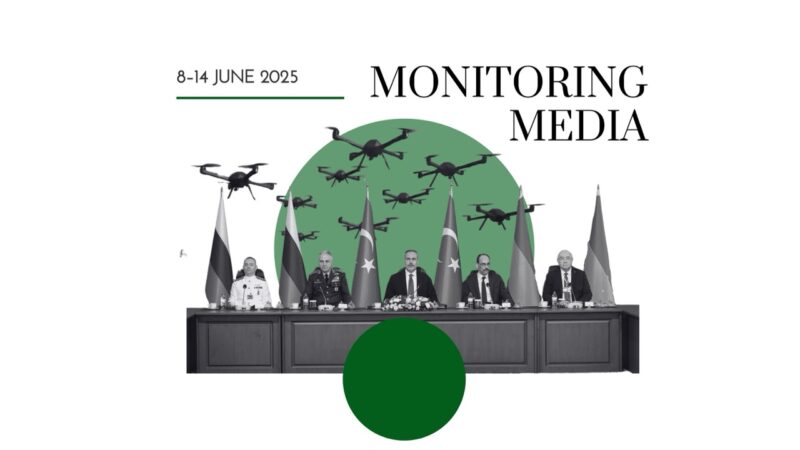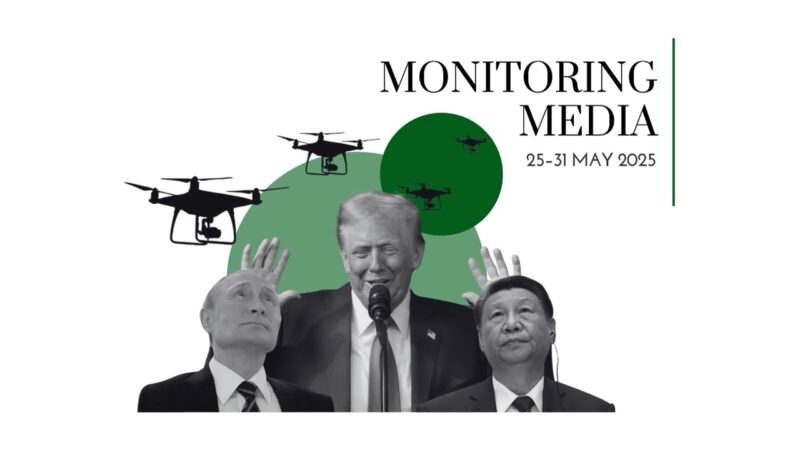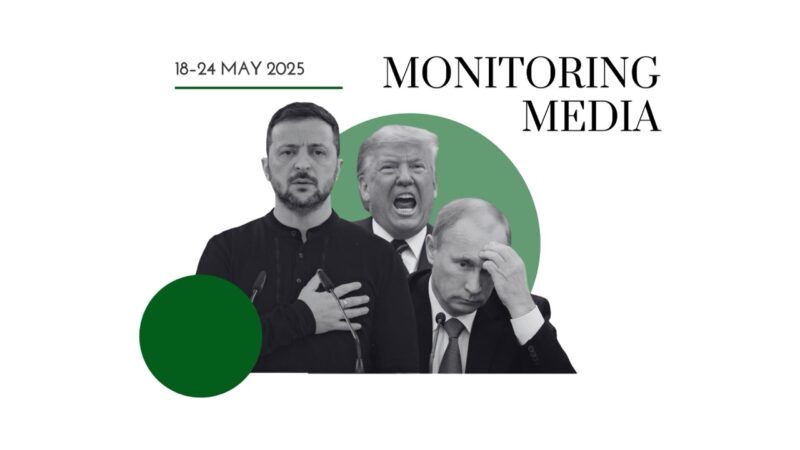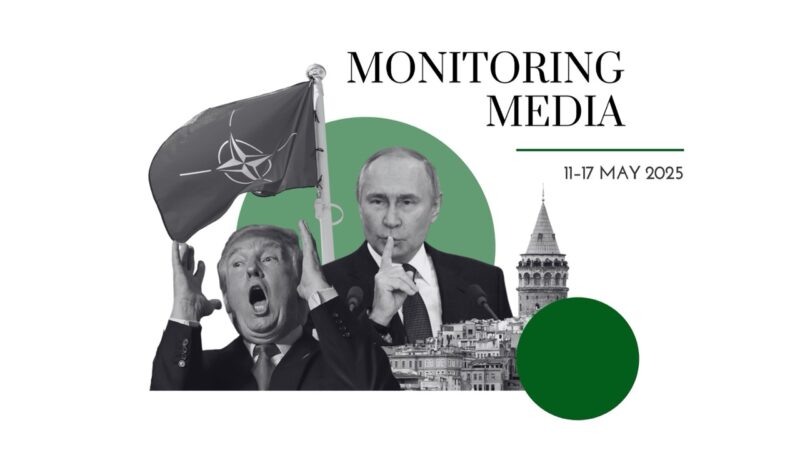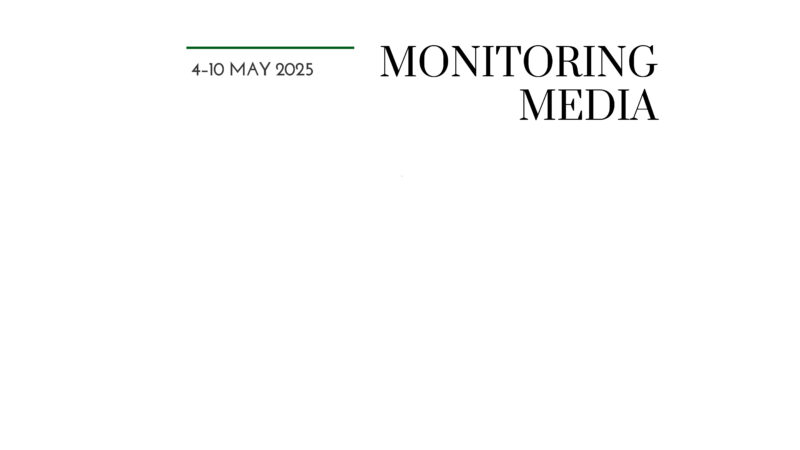Concern rises in Kyiv as Western solidarity with Ukraine’s war effort shows cracks

CIUS weekly report on North American media coverage of Ukrainian affairs, 1–7 October 2023
Six publications (Foreign Affairs, Foreign Policy, Politico, The Washington Post, The Atlantic, The Globe and Mail) were selected to prepare this report on how the situation in Ukraine has been portrayed in the North American press during the past week. The sample was compiled based on their impact on public opinion as well as on their professional reputation, popularity among the readership, and topical relevance. These publications represent centrist viewpoints on the political spectrum.
This report covers only the most-read and relevant articles about Ukraine, as ranked by the respective North American publications themselves in the past week. Its scope covers promoted articles on home pages and articles from special sections on Ukraine, with the hashtag #Ukraine, from the paper editions of the publications, and about Ukraine from opinion columns and editorials.
Topics featured in the selected articles:
- The world and Ukraine: Corruption a real threat to Ukraine, as stated in the secret “Integrated Country Strategy” document; Ukraine’s air strikes deep in Russian territory.
- Russia at war: Understanding the Russian threat means assessing Moscow’s capabilities; war in Crimea erased all of Russia’s “red lines.”
Main arguments:
Corruption is a real threat to Ukraine. Nahal Toosi (Politico) argues that the Biden administration in the USA is much more concerned about corruption in Ukraine than they publicly admit. Toosi makes this conclusion based on a confidential US strategic document obtained by Politico. In contrast to the “sensitive but unclassified” version of the long-term US plan, which cautiously emphasizes that “corruption could cause Western allies to abandon Ukraine’s fight against Russia’s invasion, and that Kyiv cannot put off the anti-graft effort,” the confidential one states more harshly that “Perceptions of high-level corruption… undermine the Ukrainian public’s and foreign leaders’ confidence in the war-time government.” The confidential version of the “Integrated Country Strategy” for Ukraine contains much more detail about the US’s goals in Ukraine, from implementing NATO standards in the armed forces and Ukraine’s production of its own military equipment to managing the banking sector and increasing the number of English-language schools. Many of the goals set out in the strategic document are aimed at reducing corruption. In particular, US officials are concerned about the role of big business in Ukraine’s economy: “Deoligarchization, particularly of the energy and mining sectors, is a core tenet to building back a better Ukraine.” According to Toosi, the Biden administration wants to press Ukraine to cut graft, not least because US dollars are at stake, but the situation is complicated by the fact that excessive publicity on this issue could lead to serious consequences: “Any perception of weakened American support for Kyiv also could cause more European countries to think twice about their role.”
Putin’s wishes are limited by his capabilities. Samuel Charap and Kaspar Pucek (Foreign Affairs) emphasize that understanding Russia’s threat is essential to respond adequately to Moscow’s aggression. However, officials and experts do not share a common view on this issue. There are three main interpretations of Putin’s goals in Russia’s war against Ukraine: (1) Putin is a maximalist whose ambitions go far beyond Ukraine, and this is only the first step in expanding his dominance; (2) Putin is obsessed with the idea of destroying Ukraine, he is a genocidaire “bent on destroying not only the Ukrainian state but also its people and culture”; and (3) Putin is a “fundamentally defensive actor” who seeks to prevent threats to his state from materializing. According to Charap and Pucek, all three interpretations are untrue. The perception of Putin as a “maximalist” or a “genocidaire” ignores an important detail: he cannot achieve either of these goals. The only tool to achieve these goals is the use of nuclear weapons. The third approach to portraying Putin’s goals contradicts Russia’s actual actions: “It is difficult to see the Russian attempt to take Kyiv in the first weeks of the war as anything other than a regime-change operation.” To accurately assess the Russian threat, it is necessary to compare the clear evidence of Putin’s initial expansionist intentions with the equally clear evidence of Russia’s limited capabilities: “The best way to understand Putin is not as an offensive maximalist, a génocidaire, or a wholly defensive actor, but rather as a tactician who adjusts his ambitions to accord with the constraints under which he operates. Analysis of the Russia threat should focus less on what he might aspire to and more on what he plausibly can get with the power he has.”
Are Ukraine’s air strikes on Russian territory effective? Daniel Byman (Foreign Policy) writes that Ukraine’s air strikes on the territory of Russia and occupied Crimea serve Ukraine’s strategic goals, not tactical ones. Ukraine has bombed numerous Russian military targets and strategic infrastructure, but this is unlikely to dramatically impact the situation on the battlefield. The consequences of the Ukrainian air strikes can hardly be compared to Russia’s large-scale and deadly bombing of Ukraine. However, against the backdrop of sanctions slapped on Russia and the Ukrainian Armed Forcesʼ counteroffensive, Byman believes that air strikes deep into Russia could also work. One possible consequence is that Russians will start to fear the air strikes and turn against their government. A more realistic result of such strikes could be to “augment the strategy of military denial by making it clear to ordinary Russians and the Russian elite that they are not winning.” It is also important that even if they are limited, these air strikes can hearten the Ukrainian resistance. Strikes deep into Russian territory are evidence that there is parity between the opponents, not just a one-way game. Finally, air strikes could force Russia to divert resources to defend its cities and infrastructure, thus weakening it on the battlefield. On the other hand, according to the author, air strikes by Ukraine can have several potentially adverse effects: first, it is challenging “to send a message about willpower, surrendering, or red lines through the use of military force”; second, Russian society can unite in the face of bombing, and Russia can claim to be acting in self-defence; third, it could lead to increased Russian attacks on Ukraine’s infrastructure; fourth, it can bolster Putin’s argument that “the Ukrainians are barbaric and that Russia’s own numerous atrocities are justified”; fifth, it could create risks for Ukraine on the diplomatic front and weaken support from states that want to restore relations with Russia.
Russia’s red line has been obliterated. Casey Michael (Foreign Policy) emphasizes that Moscow’s red lines in Crimea have been erased, and the claims about the peninsula’s near-mythical status have turned out to be fake. In December 2014, Putin declared that Crimea is not just Russia’s ancestral territory but “the ‘spiritual source’ of the entire Russian nation—a province that presented ‘invaluable civilizational and even sacral importance’ for all Russians,” a peninsula that is “the Temple Mount of Russia—as a Russian ‘holy land.’” And few in Russia and the West disagreed with this at the time. There was a widespread belief that any Ukrainian attack on Crimea could lead to a potential military escalation, so the issue of returning the peninsula to Kyiv’s control was taken off the agenda. Such sentiments were reinforced by the fear of a nuclear threat, of which Russian officials never tired of reminding us. This changed after Ukraine’s numerous and successful strikes on Crimea’s military and strategic infrastructure. According to Michael, the narrative about the sacredness of Crimea has been completely destroyed, and the threat of Moscow’s use of nuclear weapons has become even more illusory. Debunking the myth that Crimea is a “red line” for Putin is essential to understanding the illusory nature of Russia’s other “red lines.” Therefore, there is no reason for Western governments not to do everything they can to support Ukraine’s efforts to regain all of its territory, including Crimea. The author notes: “After all, it was in the Crimean Peninsula that Moscow’s irredentist invasion first began in 2014. Given that Putin’s promises that Russians would rally to the peninsula’s defense have proved hollow, undone by Putin’s own hubris, it is only fitting that Crimea is where Russia’s revanchist efforts should end.”
US commitment to Ukraine measured in numbers. Ruby Mellen and Artur Galocha (Washington Post) explain in their article that the United States has committed over $60 billion in aid to Ukraine since the beginning of Russia’s invasion. “It’s hard to put these numbers in context,” the authors note, adding that sixty billion dollars “sounds massive when compared with arbitrary data points such as the sale price of Twitter, the cost of the James Webb Space Telescope, or the cost of the Biden administration’s student loan forgiveness plan.” However, this figure “can be pretty small when compared with the entire US defense budget,” which amounts to $1.77 trillion. At the same time, $60 billion is more than the United States distributes in aid to any other country. However, according to Mellen and Galocha public support for funding Russia’s war in Ukraine is wavering, especially among Republicans. Some GOP members oppose further funding, which led to the exclusion of $20 billion in assistance to Ukraine from a temporary spending bill passed on 30 September. Given the massive financial commitment to Ukraine to date, these levels of funding and support may be politically unsustainable in the long term.
Concern rises in Kyiv following the exclusion of Ukraine aid in the new US spending bill. Isabelle Khurshudyan, David L. Stern, and Kostiantyn Khudov (Washington Post) argue that a new US spending bill that excluded some $20 billion in assistance for Ukraine has caused concern in Kyiv. Still, Ukrainian officials insist that aid to their country is not in jeopardy. They believe that bipartisan and bicameral support for Ukraine still exists and that new funds will be included in the US budget decision over the next 45 days. The bill was passed as a stopgap measure to fund the federal government but was stripped of provisions earmarking aid for Kyiv by some House Republicans. President Joe Biden and Defence Secretary Lloyd Austin have urged Congress to provide urgently needed assistance to Ukraine. The growing politicization of aid for Ukraine is a worrying shift for some, as they fear it could cripple Ukraine’s fight against Russia and damage its economy. The authors cite Kyiv-based political analyst Artem Bronzhukov, who says that President Volodymyr Zelensky’s recent visit to the United States “didn’t seem successful enough,” with the president himself having recently expressed concerns that foreign aid to Ukraine could sharply decline as the war drags on. In an interview with a Ukrainian television channel in August, Zelensky said: “Ukraine needs to grow up and understand that at one point or another, we may find ourselves alone, because one or another partner may break away due to internal processes, or even due to elections in their country.”
Ukraine might be losing its East European allies. Piotr H. Kosicki (The Atlantic) highlights a worrisome trend: international support for Ukraine appears to be waning, with key allies in Eastern Europe shifting their stance. In Slovakia, the election of Robert Fico, a pro-Russian conspiracy theorist, and his party’s reluctance to supply more ammunition to Ukraine indicate a change in attitude. According to Kosicki, a similar situation is observed in Poland: “Polish solidarity with Ukraine, too, has been dying a slow death, and preexisting xenophobia and historical memory of past ethnic violence have made ready fodder for Law and Justice propaganda.” The Law and Justice party, in power in Poland, has used anti-Ukrainian sentiments to fuel its political campaigns. At the same time, grassroots support for Ukrainians is diminishing as anti-migrant rhetoric gains traction. Apart from that, the latest events haven’t helped Ukraine to strengthen its position with neighbouring allies, according to Kosicki: “Stalwarts on whom the embattled country has relied for the past year and a half seem to be falling away. Zelensky’s travels to the UN, the United States, and Canada were meant to shore up flagging transatlantic support for Ukraine after the lackluster summer counteroffensive. But little went as planned. In the Canadian Parliament, Zelensky unwittingly became part of a standing ovation for a 98-year-old Ukrainian-born Canadian invited as a guest of the House speaker. The man was later unmasked as a former Waffen SS fighter—terrible optics for Zelensky, given Putin’s persistent attempts to tarnish Ukraine as a Nazi successor.” Kosicki concludes with a grim assessment: “Support for Ukraine is drying up both in the country’s own backyard and across the Atlantic, at a time when Kyiv still desperately needs the world’s backing. Whether the initiative now comes from anti-migrant Poland, pro-Putin Slovakia, or perhaps the EU’s long-standing Eastern European laboratory of illiberalism—Viktor Orbán’s Hungary—matters less than the bottom line: Ukraine’s days of international solidarity are numbered.”
Western solidarity for Ukraine has cracked for the first time in more than 20 months of war. Mark Mackinnon (Globe and Mail) notes that Ukraine is facing growing challenges as Western support appears to be eroding. Key allies in Central Europe, such as Slovakia, are showing signs of reducing their support for Ukraine, and there are concerns that the EU’s aid to Ukraine could be held up, as anti-war sentiments gain traction among voters. In Poland, Ukraine has become a campaign issue, and the ruling Law and Justice party has threatened to halt military support to Ukraine. Additionally, US military support for Kyiv has become a contentious issue among Republican lawmakers, raising questions about continued assistance. The possibility of former president Donald Trump returning to the White House in 2024 further complicates Ukraine’s situation, Mackinnon writes, as he has been a vocal critic of US military support for Ukraine: “The sense that Western support is something that can no longer be taken for granted hangs over the large-scale counteroffensive that Kyiv launched in June,” according to the author. “While the campaign has thus far fallen short of its initial aims, Ukrainian officials have sought to portray their relatively small gains in the southern Zaporizhzhia and eastern Donetsk regions as significant, emphasizing that Ukraine retains the initiative on the battlefield and that the counteroffensive is continuing.”
Freeland accuses Putin of weaponizing Canada’s honouring Ukrainian SS veteran. Marie Woolf (Globe and Mail) writes that Deputy Prime Minister Chrystia Freeland has accused Russian dictator Vladimir Putin of “weaponizing” the Canadian Parliament’s honouring of a Waffen-SS veteran during Ukrainian president Volodymyr Zelensky’s official visit. Putin claimed that former Speaker Anthony Rota’s tribute to 98-year-old Yaroslav Hunka supported Russia’s view that Ukraine needed to be de-Nazified. Hunka had served in the Waffen-SS Galicia Division during World War II, and his tribute sparked controversy. Freeland criticized Putin for exploiting the incident for propaganda purposes. The Kremlin has claimed that Ukraine is riddled with Nazis as part of its justification for the invasion, a claim dismissed by Canada, the US, UK, and other allies. The author quotes Professor David Marples, a scholar of history of Ukraine at the University of Alberta, who said, “Putin’s assertions about Nazism in Ukraine were not borne out by fact,” and Ukraine is also not an antisemitic country. Marples suggests that given the renewed interest in the Waffen-SS Galicia Division, it would be worthwhile to revisit the history of the Second World War with panels, discussions and studies by academics looking objectively into the period. He is also “among those calling for the disclosure of an unpublished part of the report by the Deschênes Commission, which in the mid-1980s examined claims that Canada was playing host to war criminals.” On 4 October, the Prime Minister said senior civil servants were looking into publishing the report.
